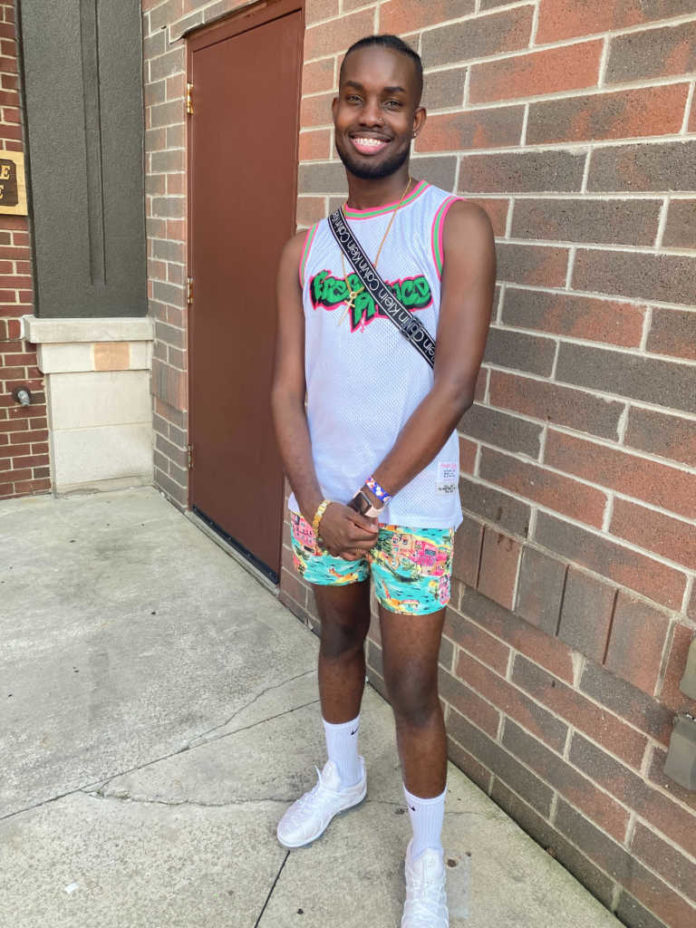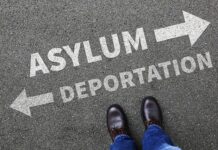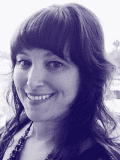Kyle Constable is a young man with a promising future. The 23-year-old Jamaican, who came to the U.S. from the island nation three years ago, is studying to become a physician assistant within the emergency medicine field.
Before settling in Garden City, Michigan, Constable first lived in Illinois, then Tennessee. Next he’s considering L.A. Or maybe Atlanta. “Basically, I’m traveling each state,” he said. “No regrets.”
But Constable’s positive outlook and sense of adventure belie the precarious nature of life for someone like him in his home country. Constable is gay. And in Jamaica, which has one of the worst records for human rights among all the Caribbean countries when it comes to LGBTQ+ people, consensual sex between men remains a crime punishable by up to 10 years in jail with hard labor.
“I actually came here because of my country’s rulings towards homosexuals, and how they [treat] persons who are a part of the LGBTQ community,” Constable said.
“It’s really bad, actually, for part of the LGBTQ community,” Constable explained. “They could be killed if a person is found out about their sexual orientation.”
In 2019, the Inter-American Commission on Human Rights (IACHR) ruled that Jamaica should repeal its colonial-era ban on same-sex intimacy because it criminalizes LGBTQ+ people — a violation of international law. By order, the decision remained strictly confidential until this year. The IACHR ruling — though celebrated — was largely symbolic.

Kyle Constable. Photo courtesy of Kyle Constable
For Constable, leaving Jamaica meant leaving his family. But, he said, “Sometimes you have to make up your mind and realize that you are going to a better place, and this better place is to help to set new goals and standards for you.”
In fact, Constable did find a “better place” when he came to this country. He has new friends and a social life, a stark difference from how he felt in Jamaica.
“I would say that there’s some places you feel different,” Constable said. “You don’t have to hide who you are.” He compared that to LGBTQ+ people “not wanting to be seen” in Jamaica. Here, “it’s a whole different, holistic approach to a different culture,” he added.
Constable said it’s unfortunate he doesn’t know of other LGBTQ+ Jamaicans living in Michigan, though he’s found LGBTQ+ friends representing different heritages who have helped him build a community for himself. In contrast to how he spent his free time in Jamaica, Constable sees a big difference in terms of the number of social activities available to him in the U.S.
“It’s pretty good,” Constable said. “You know, it’s all different. I get to know more about their culture and how they go about their daily activity.” Some of that includes going to different parks and clubs, listening to music “and meeting new friends…without being ridiculed or anything like that.”
Although being LGBTQ+ in Jamaica is far from easy, Constable does not feel his identity as a Jamaican and as a gay man are in conflict. The only conflict he observes is the way in which some Jamaicans choose to perceive LGBTQ+ people.
In the U.S., Constable said he feels more confident and comfortable about expressing himself. “That really helps, even motivates you to assist or help or be an activist for other persons — especially living in Jamaica — who are going through the same thing,” he said.
Like Constable, Tony Dunkley is of Jamaican descent. Raised in Detroit, Dunkley currently lives in Sterling Heights and works for a mortgage company. He’s never been to Jamaica, but he said his Jamaican aunt has always wanted him to go. For a while, though, she’s been worried it’s not the right time. That’s because Dunkley is transgender. Even today, the travel guide Frommer’s warns LGBTQ+ tourists against visiting the country.
“I’ve just heard different stories growing up,” said Dunkley, who first came out when he was 12 years old. He’s now 27. “My dad’s side of the family are all from Jamaica, so I wasn’t too sure how they would handle the situation,” he said. “I am very fortunate that my dad was very accepting for the most part.”
To illustrate the conditions for LGBTQ+ people in Jamaica, Dunkley described a documentary his father showed him about a gay Jamaican police officer who was brutally beaten as other police officers turned their backs.
Although it’s likely safer in the U.S., Dunkley knows firsthand it isn’t always easy being transgender here, either, or really anywhere. Because he has been able to pass as a cisgender man, Dunkley said he’s found greater acceptance from the public perhaps than others.
At first, “People were just really confused and didn’t understand,” Dunkley said. “And some people were just kind of mean and refused to understand, like, ‘Oh, I know you as ‘such’ — I’m not going to call you anything different.’” Since then, as he’s transitioned, there’s been a huge difference in how people treat him, he said.
Dunkley talked about his small circle of other trans men whom he considers his community. He doesn’t know other LGBTQ+ Jamaican Michiganders — but he’d like to.
“There’s a Jamaican LGBT community…I follow through Instagram,” Dunkley said. “And I hope to be able to find the Caribbean community [here], just with more LGBT people. That would be awesome. But for now, I just have my small group of trans men friends here in the metro Detroit area.”
Dunkley said he’s happy to be Jamaican, and that he wants to connect more with his Jamaican culture — but it’s difficult. For one thing, the reggae and dancehall music he loves often contains anti-gay messages. “It’s when I’m hearing certain songs from back in the day, I’m like, ‘Oh, I can’t even listen to this,’ ‘cause it just makes me feel kind of uncomfortable,” Dunkley said.
“But now even that’s changing, and things are changing for the better,” he continued. “And I’m just hoping that things just continue to go in the right direction.”
Earlier this year, with the support of the United Nations Programme on HIV/AIDS (UNAIDS) and the Joint United Nations Population Fund (UNFPA), the advocacy group TransWave Jamaica launched the Trans and Gender Non-Conforming National Health Strategy, the first of its kind in the English-speaking Caribbean. Not only does it seek to make change in the health care system, the initiative envisions societal changes necessary to achieve equality for transgender people.
Although neither Constable nor Dunkley has yet to find a LGBTQ+ Caribbean community in the metro Detroit area,both men have made connections with others of Caribbean heritage at the Caribbean Community Services Center (CCSC) in Detroit.
Among them are some of the 2,000 to 3,000 foreign-born people from the Caribbean (around 800 are Jamaicans) currently living in Detroit, according to 2019 U.S. Census data. Because these figures only represent people born outside the U.S. and currently residing within the city, Sophia Chue, executive director and director of community advocacy for CCSC, thinks these figures don’t show the whole picture.
Chue, whose multicultural identity is Jamaican and Chinese, said the Caribbean organizations that have existed in the area — the oldest since 1929 — largely serve a social function. “They don’t do what we do, which is typically advocacy and community service work,” Chue said.
“One of the reasons our organization was designed…was to make sure we meet the needs of our community: to ensure that there’s a welcoming environment for them, for one; and for two, to connect them with the networks that they need to make sure that they achieve the American dream or do what it is that they came to this country for,” she added.
CCSC was founded in 2017 and serves the Caribbean community largely through partnerships and collaborations. And although CCSC itself doesn’t provide programming specifically designed for the LGBTQ+ community, Chue emphasized how important inclusion is to fulfilling the organization’s mission.
“I am very deliberate about ensuring that the LGBTQIA community is involved at all levels,” Chue said.
Part of the reason Chue is a tireless advocate for the LGBTQ+ community is that she is Jamaican and she has family who identify as LGBTQIA. She’s well aware of what conditions are like for LGBTQ+ people in the Caribbean.
“We are extremely deliberate about making sure that their voices are heard,” Chue said, noting that after their 2019 fundraiser, CCSC contributed funds to J-FLAG, an LGBTQ+ advocacy organization in Jamaica. Further, she said, even at their social events performers and DJs are told there will be no homophobic jokes or music.
Sometimes, a small effort can have a big impact on individuals like Constable and Dunkley. “Our aim in this entire exercise is to ensure that their humanity is recognized when it comes to how we treat, how we talk about, how we involve LGBTQIA in the conversation,” Chue said. “And I want it to be commonplace.”







